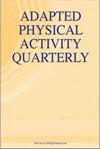轮椅运动员的完美主义、道德脱离、利他主义、反社会和亲社会行为模型。
IF 1.7
3区 医学
Q2 REHABILITATION
引用次数: 4
摘要
本研究通过对327名轮椅篮球和橄榄球运动员(M = 33.57岁,SD = 10.51;83%的男性)。利用结构方程模型,发现了以下显著的直接和间接影响。首先,完美主义努力正向预测感知的亲社会行为和利他主义。第二,完美主义关注负向预测利他主义和亲社会行为,正向预测道德脱离。反社会行为被道德脱离和利他主义正向预测。此外,完美主义关切通过道德脱离间接预测反社会行为,并通过利他主义间接预测反社会行为。最后,完美主义努力通过利他主义正向预测反社会行为。结果部分支持了完美主义通过道德脱离预测残疾运动员亲社会和反社会行为的作用。本文章由计算机程序翻译,如有差异,请以英文原文为准。
A Model of Perfectionism, Moral Disengagement, Altruism, and Antisocial and Prosocial Behaviors in Wheelchair Athletes.
Two forms of perfectionism were examined in the present study to see whether they predicted prosocial and antisocial behaviors in sport through moral disengagement and altruism in a sample of 327 wheelchair basketball and rugby athletes (M = 33.57 years, SD = 10.51; 83% male). Using structural equation modeling, the following significant direct and indirect effects were found. First, perfectionistic strivings positively predicted perceived prosocial behaviors and altruism. Second, perfectionistic concerns negatively predicted altruism and prosocial behaviors and positively predicted moral disengagement. Third, antisocial behaviors were positively predicted by moral disengagement and altruism. Furthermore, perfectionistic concerns indirectly predicted antisocial behaviors positively through moral disengagement and negatively through altruism. Finally, perfectionistic strivings positively predicted antisocial behaviors through altruism. Results provided partial support for the role of perfectionism in predicting prosocial and antisocial behaviors through moral disengagement among athletes with a disability.
求助全文
通过发布文献求助,成功后即可免费获取论文全文。
去求助
来源期刊
CiteScore
3.00
自引率
10.50%
发文量
26
审稿时长
>12 weeks
期刊介绍:
APAQ is an international, peer-reviewed, multidisciplinary journal designed to stimulate and communicate scholarly inquiry relating to physical activity that is adapted in order to enable and enhance performance and participation in people with disability. Physical activity implies fine, gross, functional, and interpretive movement including physical education, recreation, exercise, sport, and dance. The focus of adaptation may be the activity or task that is to be performed, environment and facilities, equipment, instructional methodology, and/or rules governing the performance setting. Among the populations considered are persons with motor, intellectual, sensory, and mental or other disabilities across the life span. Disciplines from which scholarship to this aim may originate include, but are not limited to, physical education, teacher preparation, human development, motor behavior and learning, biomechanics, exercise and sport physiology, and exercise and sport psychology. Scientific inquiry may originate from quantitative or qualitative inquiry, as well as from multimethod designs.

 求助内容:
求助内容: 应助结果提醒方式:
应助结果提醒方式:


